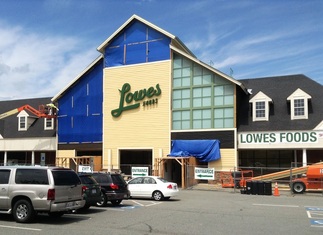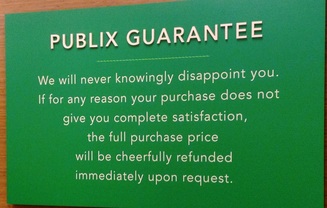 Image © by Brian E. Faulkner
Image © by Brian E. Faulkner The moment you walk in one of their rebranded, re-cultured stores, you can feel the difference. Smiles seem to arise naturally. Employees greet you and offer their help – and seem to mean it. There’s a refreshing hustle about the place. More spontaneity. Lowes Foods leadership has managed somehow to meld procedure and belief and make it work.
“Cultural branding is really at the core, at the heart of what we’re trying to do,” says the company’s enthusiastic CMO, Michael Moore, a veteran of 28-years in the grocery business. “And what I’ve experienced a lot as I’ve gone to retailers, both in the States and overseas, is that there’s so much emphasis placed on the visual side of the equation, prettying up the store, making it a little bit more shoppable, so on and so forth, but yet there’s nothing that’s done with what we call our hosts.”
Although stores like Publix (1077 stores in six southeastern states), Wegmans (84 stores in the Northeast), Whole Foods Market (371 stores nationally) and Nugget Markets (9 stores in California) are known for getting the cultural piece right. And each rises continuously on FORTUNE’s list of the 100 Best Companies to Work For*.
Nugget Markets claims that their “positive attitude and love of people” sets their associates apart, which – in turn -- sets them apart in the marketplace.
“Our associates are the difference maker,” says Chris Carpenter, their COO and Vice President, “and it is they who separate us from our competition. We believe that when our associates are having fun and feeling valued, there is an energy and enthusiasm that is created—and it transcends right through the guest.”
Lowes Foods’ management gets that. My recent conversation with CMO Moore in one of the company’s stores was interrupted several times by cheers from people in the Chicken Kitchen celebrating completion of another batch of “chicken you’d cross the road for.”
Who wouldn’t rather shop at a store where people are enthusiastic about their work – as long as quality and selection are up to par? Personal experience is just one of a dozen or so competitive factors that set any business apart – along with service, convenience, innovation, etc. Even grocers who sell primarily on price often have other competitive factors in their favor. Aldi for example, is known for its limited inventory, quality merchandise plus low price.
But the people part likely does as much, or more, to attract and hold customers than any other single competitive factor. It’s also the most challenging to make happen -- and sustain -- in the me-saturated American culture. Disney has proven the value (and endurance) of people power for decades.
“The Disney operating style has greatly influenced our training program,” says Moore. “We believe in one of the core Disney concepts in particular, which is when we’re on the floor we’re onstage, and we want the people onstage to be delightful. We want our hosts to be rabid fans, working for Lowes, and we want our guests to feel that love – and feel that commitment and support.”
Even when my local Lowes Foods store was only halfway through its renovation, the cultural transformation already had begun taking hold. I was pleasantly surprised when a man in the produce department engaged me in conversation about the mushrooms I was buying. (see http://theproducemerchant.com/produce-stand-outs/ for more about him)
Customer satisfaction is relatively easy to achieve, because it’s … relative. Creating delight, however, is quite something else and may not even be measurable except by collecting personal anecdotes and tracking repeat business. The man in produce delighted me by offering suggestions on how to store and prepare my mushrooms. A month or so later, a young woman roaming the store with crisp watermelon samples intercepted me in the cereal aisle. Her smile alone was enough to delight. And had I not been a long-time Lowes Foods customer, either "host" would have more than counterbalanced my experience a few weeks prior with the only rude clerk I’ve ever encountered at that store (a memorable example of how not to treat a customer).
“Culture is the driver in our company in all departments,” says Lowes Foods VP of Fresh Sales Chris Van Parys. “While the bricks and mortar have all evolved, of course, the take-away we have the most pride in is our people or hosts. The main focus is taking care of our guests in new and unexpected ways.”
And not everybody fits.
“There’s a certain profile we look for as we think about new hire strategy,” says Moore, “people comfortable with that kind of interaction. The folks who are not, there’s tons of great backstage kind of work that fits better for them. And we really make sure that’s front and center as people are making applications for jobs.”
The new people who have appeared in my local Lowes Foods store recently seem to embody that spirit more readily than the old crew (although there are a few choice holdovers). Even the young workers who stock the shelves have sprouted an upbeat, helpful attitude. You find much the same at Publix, where employees also are owners.
 Image © by Brian E. Faulkner
Image © by Brian E. Faulkner Max De Pree, in his seminal little book, “Leadership Is an Art”, talks about covenantal leadership, which I have seen at work in only a small handful of client organizations over the years – from small businesses to billion-dollar consumer products companies and their business units. The culture of a national apparel manufacturer/marketer I consulted to revolved around a passionate leader who created the future, invested the team in it and sponsored their success. But the company's culture proved tenuous. When the leader moved on (or in another case I recall, when corporate ownership changed), the cultural focus and inspired energy dissipated.
Lowes Foods, like Publix, appears to understand that in order to survive, qualities like “team” and “passion” and “commitment” can’t be pasted on. They have to be planted deep and lived out in the attitudes and actions of people who believe they are contributing to a larger cause. Only then can business culture become an enduring – rather than momentary – source of competitive advantage. It’s not something you can fake.
Publix hires people with “a servant’s” heart, which CEO Ed Crenshaw appears to epitomize. Lowes Foods hires people who understand the concept of “host” from the heart out, and their senior management team is quick to credit one another with the early success they’ve achieved in rebranding the chain and building a new culture. That suggests stability in an era when grocery shoppers will change stores on a dime just to get a good price.
Stability alone is no guarantor of success, of course, although stability based on a culture of believers with a can-do attitude can work wonders in attracting and keeping customers – and perhaps even help make a buck or two more than the competitor down the block.
Publix and Lowes Foods are destined to compete more directly in the near future as the Florida chain moves deeper into North Carolina. Customers are sure to respond positively to both stores’ people-powered presentations and reward them with increased business and greater loyalty.
TakeAway: People power can be a powerful source of competitive advantage. How does your culture stack up?
Content © by Brian E. Faulkner *FORTUNE and FORTUNE 100 Best Companies to Work For are registered trademarks of Time Inc.
Tags: Lowes Foods, Publix, cultural branding, Wegmans, Whole Foods Market, Nugget Markets, ALDI
About Brian Faulkner:
> blogs to establish you as the thought leader / authority in your business category
> case stories that communicate your sales successes and invite prospect inquiry
> testimonials that showcase customer / client satisfaction in 1-2 short sentences
> positioning statements to guide business development & marketing
> landing page copy to set your business or brand apart in a compelling way
> tagline development to attract the interest of your most qualified prospects
Brian also is a three-time Emmy award-winning Public Television writer and narrator of over 100 segments for UNC-TV’s popular Our State magazine series, on the air since 2003.

 RSS Feed
RSS Feed